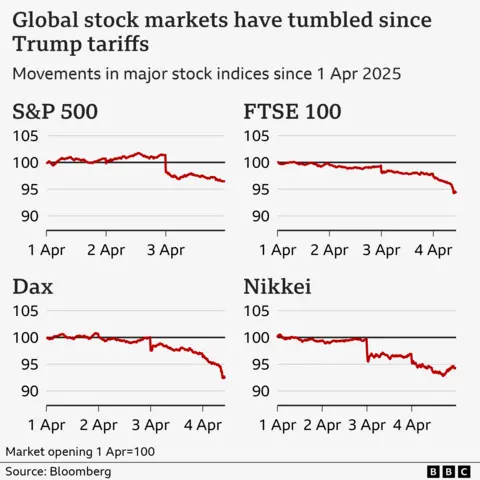
 Getty Images
Getty ImagesTurmoil on financial markets deepened on Friday, as China hit back at tariffs announced by Donald Trump, raising the likelihood of an extended trade war and damage to the global economy.
The S&P 500 index, the widest measure of the US stock market, was trading down roughly 4% in mid-day trade, while the Nasdaq had sunk about 4.3%, having lost roughly a fifth of its value since February.
In the UK, the FTSE 100 plunged almost 5% - its steepest fall in five years, while Asian markets also dropped and exchanges in Germany and France faced similar falls.
Trump, who has vowed to remake the global trade order, dismissed concerns about the market shock, noting that the US labour market is strong.
"Hang tough," he urged his followers on social media. "We can't lose."
The stock market has lost an estimated trillions in value over two days, a rout sparked by Trump's announcement of sweeping new 10% import taxes on goods from every country.
Goods from dozens of countries, including key trading partners such as China, the European Union and Vietnam, facing far higher rates.
Analysts say the moves, which are due to go into effect as soon as Saturday, amount to the biggest tax increase in the US since 1968.
They expect the measures to lead to a contraction in trade, and have warned they could drive many countries into an economic recession.
China responded on Friday by adding hitting US goods with import taxes of 34%, curbing exports of key minerals and adding US firms to its blacklist, describing Trump's actions as "bullying" and a violation of international trade rules.
Other countries have yet to respond and appear hoping they will be able to negotiate deals, despite conflicting signals from the White House about its appetite for talks.
On Friday Trump said he had a "very productive call" with the general secretary of Vietnam, while criticising China's move.
"China played it wrong, they panicked - the one thing they cannot afford to do," Trump wrote on social media in all capital letters.

Trump's announcement on Wednesday left goods from China facing an added 34% tariff rate, raising the overall levy to at least 54%.
He announced a new 20% tax on goods from the EU, and rates of more than 40% on countries in Asia such as Vietnam, which have become key centres of manufacturing since Trump started raising tariffs on China in his first term.
Trump had made similar promises on the campaign trail last year. But the moves were still more far-reaching than many analysts had expected.
"The shock factor… was Vietnam," said Simeon Siegel, managing director at BMO Capital Markets, who follows companies such as Nike, which saw shares tumble on Thursday after the announcements.
"For the past many years, most companies had been trained to believe they needed to lean out from China, but that didn't mean lean into the US," he added. "But the only place to hide, at least as of [Trump's announcement], was the US."
In the UK, the FTSE 100 index closed 4.95% lower, the biggest one-day drop since 27 March 2020.
In Europe, France's CAC 40 was down 4% while in Germany the Dax was roughly 4.6% lower.
Earlier, in Japan, where the prime minister called the situation a "national crisis", the Nikkei 225 fell more than 2.7%.
Russ Mould, investment director at AJ Bell, said the "relentless selling" had continued despite investors "hoping the pain would go away".
"There are so many moving parts that getting your head around the situation [as an investor] isn't easy," he said.
"With countless sectors set to be hit by tariffs, it's difficult to know where to begin to comprehend the situation."